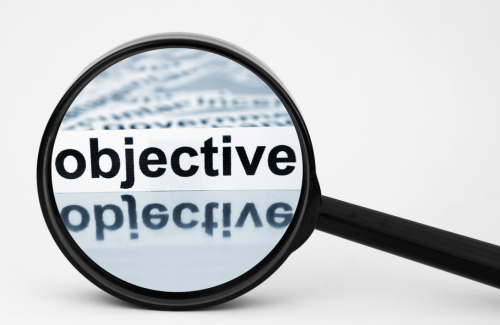If you’re in the process of creating or updating your resume, you may be wondering whether or not you need to include an objective statement. The answer is: it depends. While objective statements were once considered a standard part of a resume, opinions on their necessity have changed over time.
Some experts argue that objective statements are outdated and unnecessary, as they can be too general and too obvious and fail to provide specific information about your skills and experience. That’s where we tend to stand.
Others believe that objective statements can be useful for highlighting your career goals and showing how your qualifications align with the position you’re applying for.
Ultimately, the decision to include an objective statement on your resume is up to you. However, it’s important to consider the purpose of the statement and whether or not it adds value to your overall application. In the following sections, we’ll explore the pros and cons of including an objective statement, as well as some tips for crafting an effective one if you choose to include it.
Pros and Cons of Using an Objective on Your Resume
Pros of Using an Objective
If you are an entry-level candidate and want to explain your work ethic and dedication to a specific industry, an objective can help you highlight your characteristics and values. Mentioning your career goals in your resume objective shows how ambitious and driven you are, which are qualities that may stand out to hiring managers. It can also encourage them to pay more attention to the rest of your resume, where you can further outline your skills and qualifications.
Using an objective statement can also help you tailor your resume to the specific job you are applying for. By including a statement that aligns with the job description, you can show the employer that you have read the job posting and understand the requirements of the position.
Cons of Using an Objective
One of the main cons of using an objective statement is that it can be limiting. It shouts to a potential employer that whatever is on your objective statement is what you can do. Nothing more, nothing less. This can be a problem if you have a wide range of skills and experiences that you want to showcase. Instead of using an objective statement, it may be better to use a summary statement that highlights your key skills and experiences.
Another con of using an objective statement is that it can take up valuable space on your resume. Hiring managers may only spend a few seconds scanning your resume, so it is important to make sure that every word counts. If your objective statement is too long or not relevant to the job you are applying for, it may be better to leave it off.
Alternatives
If you are not a fan of resume objectives, there are several alternatives that you can consider. These alternatives can help you showcase your skills and experience in a more effective way.
Summary Statement
A summary statement is a brief overview of your skills and experience. It can be an effective alternative to a resume objective because it allows you to highlight your most relevant qualifications and accomplishments. A summary statement should be tailored to the specific job you are applying for and should provide a clear picture of what you can bring to the table.
Here is an example of a summary statement:
| Summary Statement: | Results-driven marketing professional with over 5 years of experience in developing and executing successful marketing campaigns. Skilled in market research, campaign analysis, and project management. Proven track record of increasing brand awareness and driving sales growth. |
Qualifications Summary
A qualifications summary is similar to a summary statement, but it focuses more on your specific qualifications and skills. It should provide a clear picture of what you can bring to the table and why you are the best candidate for the job. A qualifications summary should be tailored to the specific job you are applying for and should highlight your most relevant qualifications.
Here is an example of a qualifications summary:
| Qualifications Summary: | Experienced project manager with a proven track record of delivering projects on time and within budget. Skilled in project planning, risk management, and stakeholder communication. Strong leadership skills with the ability to motivate teams and drive results. PMP certified. |
Professional Profile
A professional profile is a brief overview of your skills, experience, and achievements. It can be an effective alternative to a resume objective because it allows you to showcase your most impressive accomplishments and skills. A professional profile should be tailored to the specific job you are applying for and should provide a clear picture of what you can bring to the table.
Here is an example of a professional profile:
| Professional Profile: | Highly skilled software developer with over 7 years of experience developing complex applications for a variety of clients. Skilled in Java, Python, and C++. Proven track record of delivering high-quality code on time and within budget. Strong problem-solving skills with the ability to work independently or as part of a team. |
When to Use an Objective
While some experts suggest that objectives are outdated, there are still some cases where they can be useful. Here are a few situations where you may want to include an objective statement:
Entry-Level Positions
If you’re just starting out in your career, an objective can help you explain your career goals and show your dedication to a specific industry. Use the objective statement to highlight your characteristics and values that make you a good fit for the job.
Career Changers
If you’re changing careers, an objective can help you show why you’re interested in the new field and how your past skills can transfer over. Be sure to explain how your previous experience can be valuable in the new role.
Industry Changes
If you’re applying for a job in a new industry, you may want to use an objective statement to explain why you’re interested in the field and how your skills can be applied. This can help the employer understand why you’re making the change and how you can be an asset to the company.
Gaps in Employment
If you’ve had a gap in your employment, an objective statement can help explain what you’ve been doing during that time and what you’re looking for in your next role. Use the statement to show your enthusiasm for the industry and your commitment to finding a new job.
Remember, an objective statement should be brief and to the point. It should explain what you’re looking for in your next role and how you can be an asset to the company. If you decide to include an objective statement, make sure it’s tailored to the specific job you’re applying for.
How to Write an Effective Objective
Writing an effective objective statement is crucial for catching the attention of potential employers. Here are a few tips to help you write an objective statement that will make your resume stand out:
Customization
Customize your objective statement to match the job you are applying for. Review the job description and identify the key skills and qualifications the employer is looking for in their ideal candidate. Then, tailor your objective statement to highlight how your skills and experience align with those requirements. This will show the employer that you are a good fit for the position and increase your chances of getting an interview.
Clarity and Brevity
Your objective statement should be clear and concise. Avoid using long, complicated sentences or industry jargon that may confuse the employer. Instead, use simple language that is easy to understand. Keep your statement brief, ideally no more than two sentences. This will help ensure that the employer reads your entire statement and understands your goals.
Specificity and Relevance
Be specific and relevant in your objective statement. Instead of using generic statements like “seeking a challenging position,” focus on your specific career goals and how they align with the job you are applying for. For example, if you are applying for a marketing position, your objective statement might read, “To obtain a marketing position where I can utilize my experience in social media and content creation to drive brand awareness and engagement.”
Remember, your objective statement is the first thing a potential employer will read on your resume. By customizing your statement, being clear and concise, and focusing on specific and relevant goals, you can make a strong first impression and increase your chances of getting hired.
Final Thought…
The decision to include an objective statement on your resume ultimately comes down to your individual circumstances and career stage. While objective statements have fallen out of favour with many resume experts due to their potential limitations, space constraints, and they’re obvious nature, they can still serve a valuable purpose for entry-level candidates, career changers, or those with employment gaps who need to provide context for their career direction.
If you do choose to include an objective statement, remember that quality trumps convention. A well-crafted, customized objective that clearly articulates your value proposition and aligns with the specific role can enhance your application. However, a generic, vague objective statement may do more harm than good.
For most professionals, alternatives like summary statements, qualifications summaries, or professional profiles offer more flexibility and impact by focusing on what you bring to the table rather than what you’re seeking. These alternatives allow you to showcase your achievements and skills while still demonstrating your fit for the position.
Regardless of which approach you choose, ensure that every element of your resume—including any opening statement—is tailored to the position, adds genuine value to your application, and effectively communicates why you’re the right candidate for the job. In today’s competitive job market, every word on your resume should work in your favour. 😊




